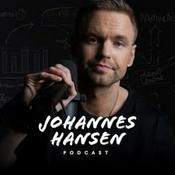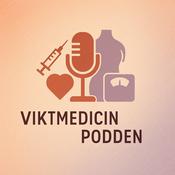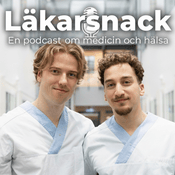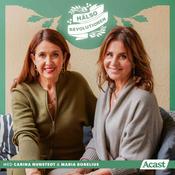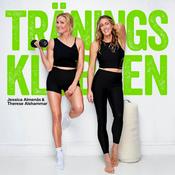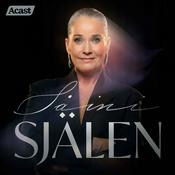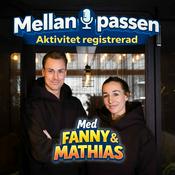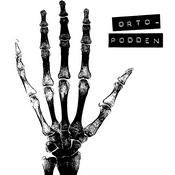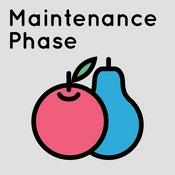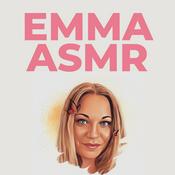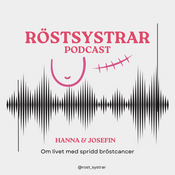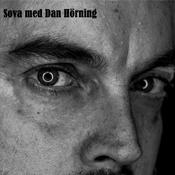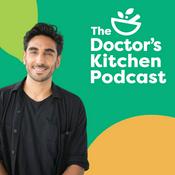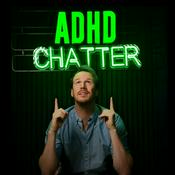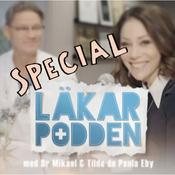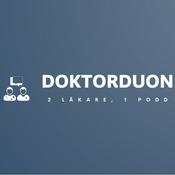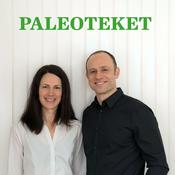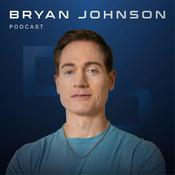492 avsnitt
E201: Hayley Gibson, Hayley Snowden and Sue Ormesher - Tackling Health Inequalities in West Yorkshire & Harrogate
2026-2-23 | 32 min.Trigger Warning: this episode discusses cancer, cancer screening, breast cancer, health inequalities and lack of access.
Episode 201: Part of the Education and Workforce Development Series (Part 67)
Description: In this powerful episode, Naman Julka-Anderson and Jo McNamara sit down with Hayley Gibson, Hayley Snowden and Sue Ormesher.
Hayley Gibson is the Principal Radiographer for Breast Imaging at Leeds Teaching Hospitals NHS Trust.
With over 21 years of experience as a radiographer, Hayley is the Lead Radiographer for Breast Imaging and has lead initiatives to improve patient care and accessibility. She has a strong passion for addressing health inequalities in breast screening and actively engage with communities to understand barriers preventing attendance. By listening to patients and stakeholders, she works to implement meaningful improvements in the service, ensuring equitable access and better outcomes for all.
Hayley Snowden is the Health Inequalities Programme Manager for the West Yorkshire and Harrogate Cancer Alliance.
Hayley began her career in operational service delivery roles managing healthy community programmes. Hayley joined the Cancer Alliance a little over 4 years ago and has a passion for improving cancer outcomes for those experiencing health inequalities.
Sue Ormesher is the communications and engagement officer for the West Yorkshire and Harrogate Cancer Alliance.
Sue began her career as a journalist on regional newspapers in the North West of England, crossing over into communications for a wide range of public, private and third sector organisations.
This episode is a deep dive into their careers, health inequalities in West Yorkshire & Harrogate and what the cancer alliance is doing to tackle the inequalities.
CPD Reflection Points:
Reflect on and discuss how health inequalities effect the uptake of breast screening of people from deprived backgrounds, people from the global majority, those with disabilities, and individuals with language or health-literacy barriers.
Design a programme of work on how to increase uptake for one or more of these groups.
Using your programme, consider how you could implement this in your area and consider the stakeholders you would need to engage with make it a success.
Complete this form for your accredited digital badge: Digital Badge Form.
Links from the Episode:
You Can Ask Me campaign
OUTPatients Remove the Doubt Campaign Greater Manchester Cancer Alliance
West Yorkshire & Harrogate Cancer Alliance
Deprivation in England checker
Research links from the Episode:
Disparities in Breast Cancer Screening and Diagnosis Among Black Women: A Path Toward Equity
Understanding barriers to breast screening: an online survey of non-attenders as part of a service evaluation in the breast screening programme in England
Healthcare affordability and breast cancer screening uptake: an ecological analysis
Rad Chat Links:
Rad Chat Website
Link Tree
Facebook
Instagram
LinkedIn
TikTok
BlueSky
YouTube
Credits: Music and jingle credits: Dr. Ben Potts and Adam Cooke.- Trigger Warning: this episode discusses cancer, cancer treatment and side effects of cancer treatment.
Episode 200: Part of the Living With and Beyond Cancer Series (Part 68)
Description: In this powerful episode, Naman Julka-Anderson and Jo McNamara talk about radiotherapy side effects, why they happen and tumour site specific
CPD Reflection Points:
Reflect on your own clinical practice around explaining side effects of treatment to your patients.
Read the prehabilitation for people living with cancer clinical and implementation guidelines and consider how you could introduce prehabiliation for your patients.
Complete this form for your accredited digital badge: Digital Badge Form.
Links from the Episode:
Royal College of Radiologists National Radiotherapy Consent Forms
SECLA Physical Activity Resources
Freedom of Interest Request NHS
PRosPer module
Social prescribing
Research links from the Episode:
Multimodal prehabilitation service for patients with colorectal cancer: the challenges of implementation
A randomized phase III trial of the impact of a structured exercise program on disease-free survival(DFS) in stage 3 or high-risk stage 2 colon cancer: Canadian Cancer Trials Group(CCTG) CO.21(CHALLENGE)
Rad Chat Links:
Rad Chat Website
Link Tree
Facebook
Instagram
LinkedIn
TikTok
BlueSky
YouTube
Credits: Music and jingle credits: Dr. Ben Potts and Adam Cooke.
© Rad Chat 2025. All rights reserved.
We (or our licensors) own all intellectual property rights in this podcast and all related content, online and offline.
You may not use, copy, modify, download, archive, reproduce, distribute, display, publish, licence, create derivative works from or commercially exploit any part of our content unless we expressly agree in writing.
You must not use any images, audio, video, graphics or clips separately from their accompanying context.
Please acknowledge Rad Chat (and any identified contributors) clearly whenever referencing or sharing our content. - Trigger Warning: this episode discusses cancer, cancer treatment, pregnancy, family planning and mental health.
Episode 199: Part of the Living With and Beyond Cancer Series (Part 67)
Description: In this powerful episode, Naman Julka-Anderson and Jo McNamara sit down with Mandy Geyman is a mom, inflammatory breast cancer survivor, and public speaker who completed chemotherapy while pregnant while also navigating an autism diagnosis for her oldest daughter. She and chaos are basically on a first-name basis. Mandy now shares her story through Instagram to help survivors feel seen and supported using humour and honest storytelling about cancer, motherhood, autism, and mental health…typically against a backdrop of 90s/Y2K nostalgia. Through her creativity and online community, she helps people reclaim joy, reconnect with their inner child and remember that healing can be both playful and empowering.
This episode is a deep dive into Mandy’s pregnancy, diagnosis and treatment for cancer along with the benefits of social media.
CPD Reflection Points:
Read and be aware of breast cancer signs and symptoms.
Read this blog and reflect about Mandy’s journey.
Consider how physiological breast changes during pregnancy and the postpartum period can mask malignancy.
Reflect on how evidence-based cancer care can be adapted during pregnancy without compromising pregnancy outcomes, including the timing of imaging, surgery, and systemic therapies, and how multidisciplinary decision-making supports this balance.
Complete this form for your accredited digital badge: Digital Badge Form.
Links from the Episode:
Mummy’s Star Charity
Bright Spot Network
Cancer and pregnancy register
BRCA 1 and BRCA2
Hope for Two Charity
Neulasta
Article: “Why More Women Are Facing Breast Cancer in Pregnancy and Postpartum” by Erica Sloan (11/7/25)
Research links from the Episode:
CAnceR IN PreGnancy(CARING) – a retrospective study of cancer diagnosed during pregnancy in the United Kingdom
Adverse pregnancy outcomes and multiple cancers risk in both mother and offspring: an umbrella review of systematic reviews with meta-analyses
Long-term Mortality in Individuals Diagnosed With Cancer During Pregnancy or Postpartum
Effects of pregnancy on breast cancer immunology: immune biomarker and TIL quantification
A systematic review and meta-analysis of pregnancy-associated breast cancer incidence rate
Survival in pregnancy-associated breast cancer patients compared to non-pregnant controls
Pregnancy vs. Postpartum Breast Cancer: Distinct Tumour Biology and Survival Trends in a Contemporary Cohort
Gestational breast cancer: distinctive molecular and clinico-epidemiological features
Shared immunosuppressive mechanisms between pregnancy & cancer
Maternal age, delayed childbirth & breast cancer risk
Rad Chat Links:
Rad Chat Website
Link Tree
Facebook
Instagram
LinkedIn
TikTok
BlueSky
YouTube
Credits: Music and jingle credits: Dr. Ben Potts and Adam Cooke.
© Rad Chat 2025. All rights reserved.
We (or our licensors) own all intellectual property rights in this podcast and all related content, online and offline.
You may not use, copy, modify, download, archive, reproduce, distribute, display, publish, licence, create derivative works from or commercially exploit any part of our content unless we expressly agree in writing.
You must not use any images, audio, video, graphics or clips separately from their accompanying context.
Please acknowledge Rad Chat (and any identified contributors) clearly whenever referencing or sharing our content. - Trigger Warning: this episode discusses cancer, cancer treatment, uncertainty, faith and spirituality, death and dying.
Episode 198: Part of the Living With and Beyond Cancer Series(Part66)
Description: In this powerful episode, Naman Julka-Anderson and Jo McNamara sit down with Juliet Uzoma Aguwa, known as Juliet-U, is an actress, author, and breast cancer survivor whose story embodies courage and rebirth. After surviving Stage 3C breast cancer, she turned her pain into purpose through her inspiring memoir, Flowers of Courage. Blending her background in acting, healthcare, and advocacy, Juliet uses her voice to empower women and bridge the gap in cancer awareness between Africa and the Western world. Her message of hope, healing, and faith continues to inspire audiences globally through her platform, Juliet-U: Bravefaith.
This episode is a deep dive into Juliet’s inspirational journey through her cancer pathway from diagnosis to post-treatment, her advocacy work and how she bridges the gap in cancer awareness between the African and Western World.
CPD Reflection Points:
reflect on Juliet’s pathway. Reflect on your current understanding of patient-centred care, particularly in global majority communities.
consider your own views on faith and spirituality, and how you might support people living with and beyond cancer to navigate their own faith and spirituality.
what practical steps can you take within your professional practice to help bridge gaps in cancer awareness, early detection, or support between African and Western healthcare contexts, as highlighted in this episode?
watch Juliet’s video on top tips for breast cancer awareness.
Complete this form for your accredited digital badge: Digital Badge Form.
Links from the Episode:
Flowers of Courage
Juliet’s Journey on Susan G. Komen Breast Cancer Foundation
Breast Cancer Now - Signs and Symptoms
CoppaFeel Self-Check
Research links from the Episode:
Understanding Narrative Effects: The Impact of Breast Cancer Survivor Stories on Message Processing, Attitudes, and Beliefs Among African American Women
Randomized controlled trial of a breast cancer Survivor Stories intervention for African American women
Exploring grassroots feedback about cancer challenges in South Africa: a discussion of themes derived from content thematic analysis of 316 photo-narratives
Intersectionality Impacts Survivorship: Identity-Informed Recommendations to Improve the Quality of Life of African American Breast Cancer Survivors in Health Promotion Programming
Socio-cultural beliefs and perceptions influencing diagnosis and treatment of breast cancer among women in Ghana: a systematic review
Nigeria Specific:
Willingness to Implement Narrative Communication Interventions: Mixed Methods Study Among Breast Cancer Patients and Survivors at the University College Hospital, Ibadan, Nigeria
The Lived Experience of Suffering by Nigerian Female Breast Cancer Survivors: A Phenomenological Perspective
How do Nigerian women construct the patterns of the meaning of their experiences and identities as breast cancer survivors? Illuminating Newman’s theory of health as expanding consciousness
Social capital in the management of breast cancer in Lagos, Nigeria
Breast Cancer Survivorship in Nigeria: The Experience of Survivors and Need for Development of Supportive Care, Nigeria & UK
Rad Chat Links:
Rad Chat Website
Link Tree
Facebook
Instagram
LinkedIn
TikTok
BlueSky
YouTube
Credits: Music and jingle credits: Dr. Ben Potts and Adam Cooke.
© Rad Chat 2025. All rights reserved.
We (or our licensors) own all intellectual property rights in this podcast and all related content, online and offline.
You may not use, copy, modify, download, archive, reproduce, distribute, display, publish, licence, create derivative works from or commercially exploit any part of our content unless we expressly agree in writing.
You must not use any images, audio, video, graphics or clips separately from their accompanying context.
Please acknowledge Rad Chat (and any identified contributors) clearly whenever referencing or sharing our content. - Trigger Warning: this episode discusses cancer, cancer treatment, death and dying, genetic testing and how to talk to your children about cancer.
Episode 197: Part of the Living With and Beyond Cancer Series (Part 65).
Description: In this powerful episode, Naman Julka-Anderson and Jo McNamara sit down with Carly Moosah.
Carly is the Patient Champion of Bloom43. Through her lived experience of breast cancer, Carly has used her own experience to support others within the community. Breast cancer advocate, speaker, coach, certified end of life doula and content creator. Carly is also the co-host of monthly BRCA support groups and show and tell events at Future Dreams House in London helping women to prepare for their Breast surgeries with confidence.
In this insightful episode, Naman Julka-Anderson and Jo McNamara hear about Carly’s journey navigating breast cancer, BRCA testing, advocacy work, Plexaa and Bloom43.
CPD Reflection Points:
Read this article and reflect on Carly’s treatment journey.
Reflect and consider how an increased knowledge of BRCA gene function and associated risks change your approach to discussing genetic risk and screening with patients or to talk to your family/friends about it?
Consider how integrating patients’ lived experiences with clinical information about genetic testing enhance communication and support in practice?
Complete this form for your accredited digital badge: Digital Badge Form.
Links from the Episode:
Ashkenazi Jewish ancestry and cancer
The NHS Jewish BRCA Testing Programme
Breast reconstruction using your own tissue
Pembrolizumab(Keytruda)
BRCA Chatter
Future Dreams Charity
Plexaa Bloom43
Macmillan prehabiliation guidelines
Research links from the Episode:
Thermal Preconditioning for Surgery: A Systematic Review
Rad Chat Links:
Rad Chat Website
Link Tree
Facebook
Instagram
LinkedIn
TikTok
BlueSky
YouTube
Credits: Music and jingle credits: Dr. Ben Potts and Adam Cooke.
© Rad Chat 2025. All rights reserved.
We (or our licensors) own all intellectual property rights in this podcast and all related content, online and offline.
You may not use, copy, modify, download, archive, reproduce, distribute, display, publish, licence, create derivative works from or commercially exploit any part of our content unless we expressly agree in writing.
You must not use any images, audio, video, graphics or clips separately from their accompanying context.
Please acknowledge Rad Chat (and any identified contributors) clearly whenever referencing or sharing our content.
Fler podcasts i Hälsa och motion
Trendiga poddar i Hälsa och motion
Om Rad Chat
Rad Chat is a forward-thinking global knowledge hub where healthcare professionals can advance their knowledge and expertise in radiotherapy and oncology by utilising the award winning, first therapeutic radiographer led oncology podcast and social media channels.
We're empowering healthcare professionals worldwide by providing free, CPD-accredited radiotherapy and oncology education, by sharing real-world experience, expert insights, best practice and patient perspectives, we're helping healthcare professionals’ advance cancer care and improve patient outcomes.
Podcast-webbplatsLyssna på Rad Chat, Johannes Hansen Podcast och många andra poddar från världens alla hörn med radio.se-appen
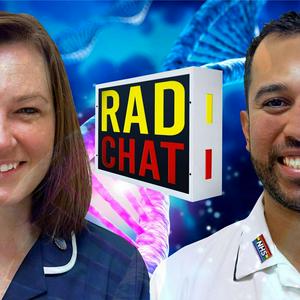
Hämta den kostnadsfria radio.se-appen
- Bokmärk stationer och podcasts
- Strömma via Wi-Fi eller Bluetooth
- Stödjer Carplay & Android Auto
- Många andra appfunktioner
Hämta den kostnadsfria radio.se-appen
- Bokmärk stationer och podcasts
- Strömma via Wi-Fi eller Bluetooth
- Stödjer Carplay & Android Auto
- Många andra appfunktioner


Rad Chat
Skanna koden,
ladda ner appen,
börja lyssna.
ladda ner appen,
börja lyssna.


